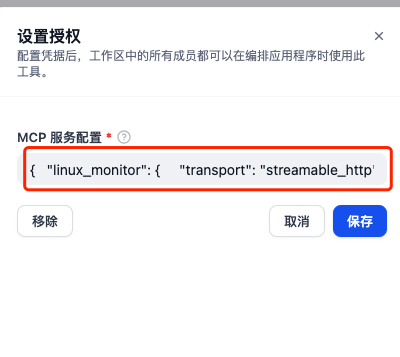- Explore MCP Servers
- mcp-server-demo
Mcp Server Demo
What is Mcp Server Demo
mcp-server-demo is a demonstration project designed to interface with Dify’s MCP SSE/StreamableHTTP plugin. It is built using the streamable_http transport mode and provides a simple functionality to query the CPU utilization of a Linux server.
Use cases
Use cases for mcp-server-demo include monitoring CPU performance in real-time, integrating with other monitoring tools, and validating the functionality of the MCP SSE/StreamableHTTP plugin in a development or testing environment.
How to use
To use mcp-server-demo, clone the repository from GitHub, set up a virtual environment, install the necessary dependencies, and run the server. Configuration for the MCP SSE/StreamableHTTP plugin must be done by providing the server’s IP address in a JSON format.
Key features
Key features of mcp-server-demo include: 1) Integration with Dify’s MCP SSE/StreamableHTTP plugin; 2) Ability to monitor Linux server CPU utilization; 3) Simple setup and execution process; 4) Support for Python 3.10, 3.11, and 3.12.
Where to use
mcp-server-demo can be used in various fields such as system monitoring, performance analysis, and server management, particularly in environments that utilize Dify’s MCP functionalities.
Clients Supporting MCP
The following are the main client software that supports the Model Context Protocol. Click the link to visit the official website for more information.
Overview
What is Mcp Server Demo
mcp-server-demo is a demonstration project designed to interface with Dify’s MCP SSE/StreamableHTTP plugin. It is built using the streamable_http transport mode and provides a simple functionality to query the CPU utilization of a Linux server.
Use cases
Use cases for mcp-server-demo include monitoring CPU performance in real-time, integrating with other monitoring tools, and validating the functionality of the MCP SSE/StreamableHTTP plugin in a development or testing environment.
How to use
To use mcp-server-demo, clone the repository from GitHub, set up a virtual environment, install the necessary dependencies, and run the server. Configuration for the MCP SSE/StreamableHTTP plugin must be done by providing the server’s IP address in a JSON format.
Key features
Key features of mcp-server-demo include: 1) Integration with Dify’s MCP SSE/StreamableHTTP plugin; 2) Ability to monitor Linux server CPU utilization; 3) Simple setup and execution process; 4) Support for Python 3.10, 3.11, and 3.12.
Where to use
mcp-server-demo can be used in various fields such as system monitoring, performance analysis, and server management, particularly in environments that utilize Dify’s MCP functionalities.
Clients Supporting MCP
The following are the main client software that supports the Model Context Protocol. Click the link to visit the official website for more information.
Content
mcp-server-demo
Overview
为了测试验证Dify的MCP功能,Dify上使用MCP SSE/StreamableHTTP插件,需要一个mcp server来对接验证。本项目采用streamable_http传输模式构建的的mcp-server示例,实现了查询linux服务器cpu利用的简单功能。
最终效果如下图所示

Get Started
如何安装MCP SSE/StreamableHTTP插件,这里不赘述
下载代码
git clone https://github.com/hchyue/mcp-server-demo.git cd mcp-server-demo
运行环境
# Create a virtual environment and install dependencies # 如何没有安装uv,可以执行下面这个命令,如果已经安装,可以跳过 # macOS pip3 install uv --break-system-packages # Linux(ubuntu) pip3 install uv --break-system-packages
执行
# We support using Python 3.10, 3.11, 3.12 uv venv .mcpvenv --python=3.10 # Activate the virtual environment # For macOS/Linux source .mcpvenv/bin/activate uv pip install psutil Flask python mcp-server.py
MCP SSE/StreamableHTTP插件的授权配置
找到MCP SSE/StreamableHTTP插件的授权配置入口

填写如下的json,注意x.x.x.x是mcp-server.py所运行的server IP
{ "linux_monitor": { "transport": "streamable_http", "url": "http://x.x.x.x:5000/mcp", "headers": { "X-Mcp-Protocol": "streamable_http", "X-Mcp-Version": "1.0", "Content-Type": "application/json" }, "timeout": 30, "provider_name": "linux_monitor" } }

验证
创建一个agent,增加“mcp_sse 获取MCP工具列表”和“mcp_sse 调用MCP工具”两个工具,然后输入“使用mcp工具获取cpu利用率”

Dev Tools Supporting MCP
The following are the main code editors that support the Model Context Protocol. Click the link to visit the official website for more information.










